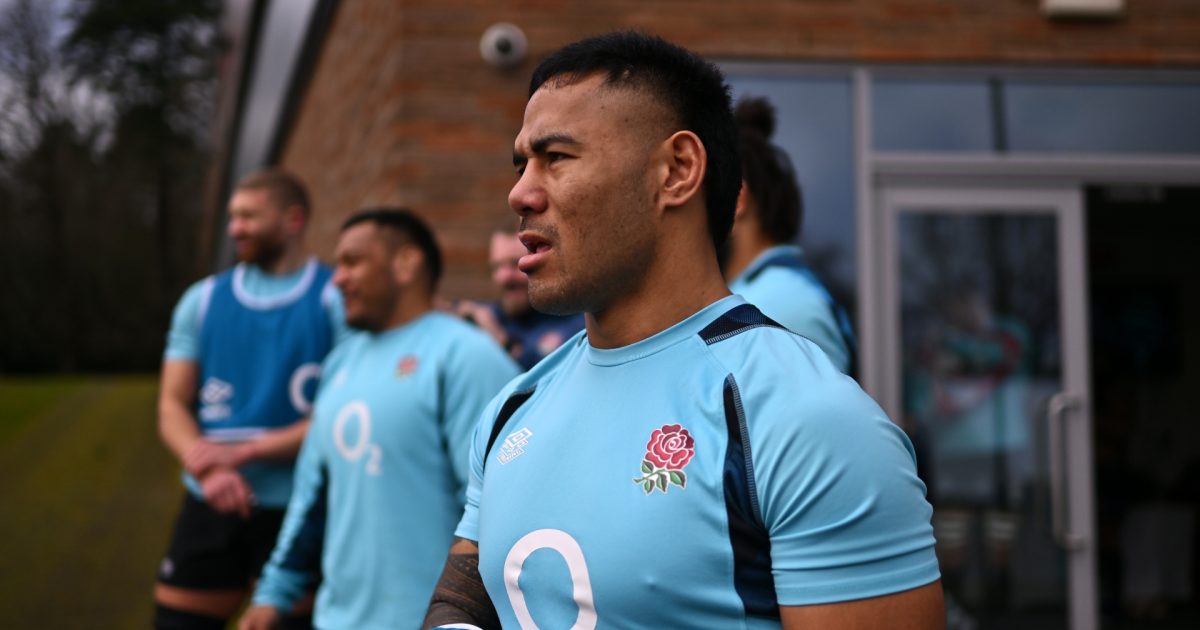Manu Tuilagi on his 2015 arrest, getting sent home by England in 2017

Manu Tuilagi has given a revealing interview on the latest England Rugby Podcast: 02 Inside Line, including his recollection of his 2015 arrest by police in Leicester and getting sent home from the national team’s training camp two years later for drinking.
The 31-year-old is this week poised to potentially get into the starting XV to face Ireland following a 2023 Guinness Six Nations where he was initially dropped by Steve Borthwick and then subsequently banned following a red card when playing for Sale in the Gallagher Premiership.
That suspension has now expired and with Ollie Lawrence now hamstrung and unavailable following last Saturday’s record Twickenham defeat to France, the expectation is that Tuilagi will likely start versus the Grand Slam-chasing Ireland in Dublin.
It won’t be until Thursday 5pm when Borthwick publicly confirms his England XV and in the meantime, Tuilagi has given a fascinating interview detailing his life and career, starting with his upbringing in Samoa and then his emigration to England as a teenager in December 2004.
Soon following in his brothers’ footsteps by playing professional rugby, Tuilagi went on to break through at Leicester before going on to earn his first England cap in 2011. The midfielder, though, claimed that that the downs he experienced in life since then were the making of him – namely the unrelenting series of injuries he suffered which left him contemplating retirement, and also some of the reputationally damaging off-the-field experiences that hurt him.
“I had a lot of ups and downs in my career,” said Tuilagi in the 25-minute interview that also included contributions from his older brother Freddie, Richard Cockerill, Henry Slade and Maro Itoje. “The downs are the ones that I remember. When you have a bad experience, you must remember, not try to forget it so you can learn from it. I have had a lot of lessons and the bad experiences are the most important ones for me.
“For me, a young lad who burst onto the scene playing for England, I’d said it (was) probably gone to my head and also with the injuries that I had, it was very frustrating. At the time I didn’t deal with it very well. It was new to me. I was never injured. When you’re playing you are flying and all of a sudden you are out on the sideline and that mentally got me. Drinking, getting arrested, drinking and getting sent home. Looking back, it’s like my mind frame wasn’t good.”
Specifically recalling his 2015 arrest, Tuilagi explained: “We were out for the brother-in-law’s birthday. We were in Terrace in Leicester, great place. Finished there, came out, was like, ‘Okay I’m going home’, went to get a taxi that stopped sort of right on the corner.
“I opened the door and I am like standing here to get everyone to come in. He went slightly forward, hit my shoulder… he said something back and I just grabbed him. One of my brothers came and took me off so we were walking down the road and I remember the police came and sort of grabbed me and I pushed them away and we carried on walking.
“All of a sudden, a big van came along the side of us, and eight or 10 police officers came out. One of the guys came over and said, ‘Manu, you are going to have to come with us’. Nice guy, a good man, no force or anything. I was like, ‘It’s amazing’. It was, ‘Manu, you are going to have to come with us’. I was like, ‘Yeah’. I went in the back of the big van and stayed there for the night.”
It was two years later, some months after he failed to get selected for the 2017 British and Irish Lions to tour New Zealand, when Tuilagi and Denny Solomona were sent home from an England training camp over for drinking, a situation the RFU politely described at the time as “team culture issues”.
“I just wasn’t in the right frame of mind,” explained Tuilagi. “Defensive all the time, feeling the world is against you, but actually when I look back it’s like you have got to take responsibility for it. For me, everything that happens in your life is for you whether it is good or bad and I understand now the bad experience for me is the best.
“I have been through it, I know what it is like, but you must learn from them. That is the only good thing that can come out of it is to learn from it. If a lesson comes out and you don’t learn it will come up again and again. It was crazy times, but I am grateful for it because I know I have been there, I have experienced it.”


























































Yeah, just a shame he tries to injure people on the field All the time which always results in cards or injuries. Could’ve been a great player.